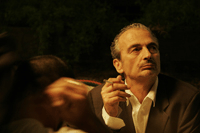If there is a kindred spirit to Jacques Nolot’s Before I Forget a stark and brooding portrait of aging, mortality, and loneliness, it is probably Ventura Pons’s contemporary film, Barcelona (A Map), a rumination on architecture and empty spaces as a reflection of internalized, decaying emotional landscapes. This internal struggle is uncompromisingly laid bare in the film’s opening sequence, as a restless and convulsive Pierre Pruez (Jacques Nolot), wracked with pain from his failing health and struggling with the side effects of his HIV medication, rises from his bed to vomit on the bathroom sink, before mechanically taking another tablet to quell his nausea. A ruggedly handsome, well-heeled former gigolo who once cruised the red light district of Pigalle with such notable figures as critic and philosopher Roland Barthes, Pierre, now aging, estranged from friends (usually fellow hustlers who navigated through the same social circles in their youth), and financially insecure after having separated from his benefactor, Toutoune (Albert Mainella) years earlier, approaches twilight of his life with a somber defiance, penning his memoirs in his self-created isolation. Forced into increasingly humiliating situations by his paid young lover, Marc (Bastien d’Asnières), repeatedly cut short at potential breakthrough moments by his inattentive psychiatrist (David Kessler) during their therapy sessions (only to be offered superficial advice as a remedy for his despair), disinherited by Toutoune’s estate when his former benefactor dies intestate (his will having curiously disappeared in the days before his death), and learning of his pragmatic friend, Georges’s (Jean Pommier) success in obtaining an inheritance for an ex-convict and escort, Bruno (Bruno Moneglia) after a benefactor’s death, Pierre’s life has been reduced to a series of transactions that provide a semblance of connection. In this respect, the film also evokes Robert Bresson’s Une Femme deuce in the way companionship and intimacy are negotiated and commodified, where even grocery deliveries and lunch dates equally serve as excuses for fleeting intimacy as reflections of their implied role within the relationship (in one humorous encounter, Georges boasts of his bargain hunting abilities in procuring a young companion at half the price that Pierre pays Marc, and offers to arrange an introduction). Curiously, it is within this intersection of commodity and intimacy that Nolot similarly finds kinship with Pons’s film, closing with the idiosyncratic image of the protagonist in drag that neither reflects a social perversion nor self-mortification, but rather, an act of reinvention, libertine defiance, and reasserted identity.
© Acquarello 2008. All rights reserved.
